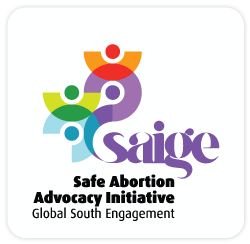by Vinitha Jayaprakasan
Programme Officer, Safe Abortion For Everyone, The YP Foundation

Last month, I got the opportunity to participate in one of the biggest multi-sectoral convenings on advancing gender equality – the Women Deliver (WD) Conference in Kigali, Rwanda. It was an overwhelming journey packed with many mixed emotions. I was enthralled by the possibility and the privilege of marking such spaces and asserting feminist politics as a young queer bahujan woman and interacting with fierce feminists across the globe.
This was the first time I was attending a conference of such a large scale. Such spaces can be overwhelming for a young person. Grasping the vocabulary, understanding how systems work, and still fiercely seeking accountability requires perseverance and courage. These challenges along with navigating youth spaces which often end up being tokenistic were highlighted in an informal gathering hosted by CHOICE for Youth & Sexuality and The YP Foundation (TYPF) for young feminists attending WD. We created a support group and cheered for each other, especially where young folks spoke on panels with experts that often refuse to acknowledge and validate the expertise and lived experiences of young people. In one of the panels by Restless Development, I along with other young fierce feminists from the Global South asserted the need and importance of supporting and funding youth-led movements led by people from marginalised backgrounds of caste, race, religion, sexuality, disability, and gender – especially in countries experiencing conflicts and shrinking human rights.
Despite WD’s scale and magnificence, it was also a reminder of how difficult it still is for marginalised communities and grassroots organisations from developing countries to occupy such spaces. It was definitely empowering to see fellow queer and disability rights feminists voicing out the gaps and advocating for inclusivity not just on who gets to participate, but also questioning the political ideologies and representations that are supported by important advocacy spaces that influence global human rights politics. As critical feminists, we must continue to question, engage, be accountable, and strive for better.
I was excited to visit Rwanda after learning about its impeccable journey of recovering from one of the most horrifying genocides. It was inspiring to learn how as a nation, it took active measures to remember its history and never repeat the injustice that was meted out by power, hate, and exploitation. The Genocide Museum was a reminder of hope, resilience, and change. On the second day, I was fortunate to attend the second ever Kigali Pride Event. While homosexuality is not illegal in Rwanda, queer people continue to face discrimination. I was glad I could join Rwandan queer activists and allies who challenged the stigma and celebrated queerness in what was a uniquely wholesome experience.

I spoke on multiple panels and attended sessions addressing the need for the inclusion of abortion rights in the global SRHR discourse. The Women’s Global Network for Reproductive Rights (WGNRR) and TYPF organised a gathering for Global South abortion advocates on the last day of the conference. The September 28th International Safe Abortion Day theme was launched – Unstoppable Movements, with the subtheme of Young People’s Leadership in Abortion Justice. We shared strategies for countering anti-choice narratives, how we could improve and build unstoppable inclusive movements, and acknowledged the role of brave young leaders who are at the forefront of the movement. With more and more diminishing spaces to advocate, we celebrated our journey and extended solidarity to continue fighting for abortion rights when we returned from the conference. While Women Deliver was a wonderful space to interact with diverse activists and leaders, and learn from their struggles and movements, it also left us remembering the work that needs to be done. I hope such spaces thrive, and have more marginalised young voices in the coming future.
